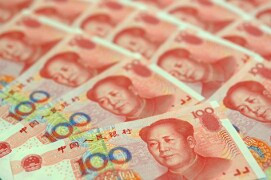
The Chinese yuan is reversing its gains this week after touching a one-week high on Wednesday. The decline came as the central bank warned some of the nationâs largest financial institutions about potential âherd behaviorâ and momentum-chasing moves in the foreign exchange market.
On Thursday, according to Bloomberg, the Peopleâs Bank of China (PBOC) urged the big banks to prevent any âherd behaviorâ that might form in the wake of the yuan slumping to a 13-month low. The central bank believes that any significant moves in the forex market might create a backlash for the currency, which could threaten the success of its stabilization policies.
In recent weeks, the PBOC has instituted a series of tools, such as adopting a new reserve requirement ratio rule, to ensure the forex market is stable and that the yuan remains flexible to move in both directions.
The measures came at around the same time the federal government implemented stimulus efforts, such as injecting liquidity in the market and boosting lending across the economy. These efforts are meant to spur economic growth after enduring several months of sluggish growth.
The yuan had been advancing on the temporary easing of trade tensions between the US and China earlier in the week. However, the trade spats quickly intensified once again after Beijing imposed new tariffs on $16 billion worth of goods and threatened to target liquefied natural gas (LNG) exports. Washington has promised to retaliate and potentially slap levies on all Chinese goods coming into the US.
HSBC provided the yuan with some positive news on Wednesday after forecasting that it would gain on the US dollar this year.
Speaking in an interview with CNBC, Cheuk Wan, head of investment strategy and advisory for Asia at HSBC Private Bank, projected that the yuan will eventually stabilize this year, citing a range of data and current circumstances.
Currently the market is very much driven by negative sentiment induced by concerns about trade tensions. We think that the market is currently projecting a pretty pessimistic scenario.
Of course, we’ll need to take into account potential downside risks of further deterioration in the trade tensions.
Given that domestic demand contributes more than 90% of China’s GDP growth, domestic demand growth would hold key to financial and economic stability in the second half of the year.
The USD/CNY currency pair tumbled 0.23% to 6.8206, from an opening of 6.8365, at 18:42 GMT on Thursday. The EUR/CNY fell 0.77% to 7.8764, from an opening of 7.9382
If you have any questions, comments or opinions regarding the Chinese Yuan,
feel free to post them using the commentary form below.